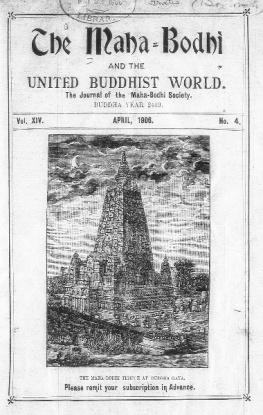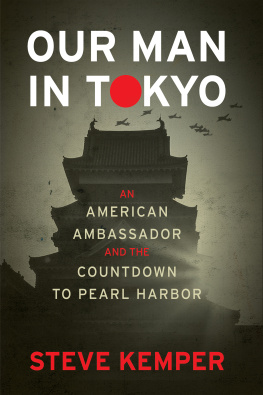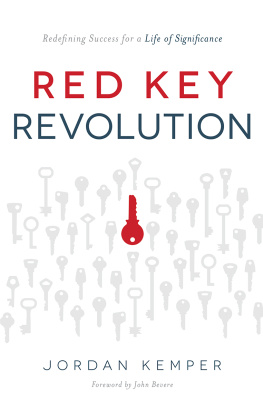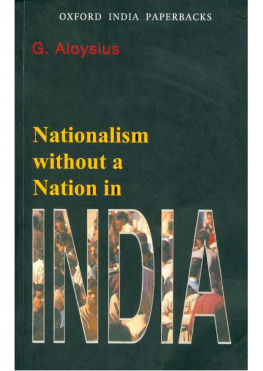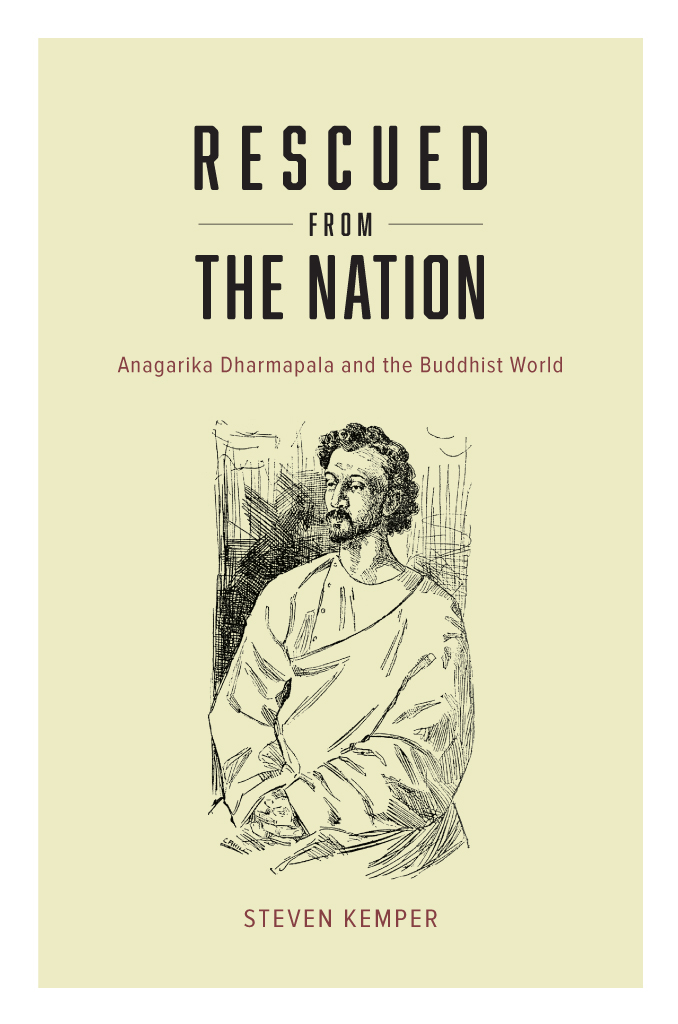RESCUED FROM THE NATION
BUDDHISM AND MODERNITY
A series edited by Donald S. Lopez Jr.
Recent Books in the Series
Grains of Gold: Tales of a Cosmopolitan Traveler by Gendun Chopel, translated by Thupten Jinpa and Donald S. Lopez Jr. (2014)
Religious Bodies Politic: Rituals of Sovereignty in Buryat Buddhism by Anya Bernstein (2013)
The Birth of Insight: Meditation, Modern Buddhism, and the Burmese Monk Ledi Sayadaw by Erik Braun (2013)
From Stone to Flesh: A Short History of the Buddha by Donald S. Lopez Jr. (2013)
The Museum on the Roof of the World: Art, Politics, and the Representation of Tibet by Clare E. Harris (2012)
RESCUED FROM THE NATION
Anagarika Dharmapala and the Buddhist World
STEVEN KEMPER
THE UNIVERSITY OF CHICAGO PRESS
CHICAGO AND LONDON
STEVEN KEMPER is the Charles A. Dana Professor of Anthropology at Bates College and the author of The Presence of the Past and Buying and Believing, the latter also published by the University of Chicago Press.
The University of Chicago Press, Chicago 60637
The University of Chicago Press, Ltd., London
2015 by The University of Chicago
All rights reserved. Published 2015.
Printed in the United States of America
24 23 22 21 20 19 18 17 16 15 1 2 3 4 5
ISBN -13: 978-0-226-19907-8 (cloth)
ISBN -13: 978-0-226-19910-8 (e-book)
DOI : 10.7208/chicago/9780226199108.001.0001
Library of Congress Cataloging-in-Publication Data
Kemper, Steven, 1944 author.
Rescued from the nation : Anagarika Dharmapala and the Buddhist world / Steven Kemper.
pages cm (Buddhism and modernity)
Includes bibliographical references and index.
ISBN 978-0-226-19907-8 (cloth : alkaline paper) ISBN 0-226-19907-X (cloth : alkaline paper) ISBN 978-0-226-19910-8 (e-book) ISBN 0-226-19910-X (e-book) 1. Dharmapala, Anagarika, 18641933. 2. Buddhist monksSri LankaBiography. I. Title. II. Series: Buddhism and modernity.
BQ 950. H 37 K 46 2015
294.3092dc23
[B]
2014028190
This paper meets the requirements of ANSI / NISO Z 39.48-1992 (Permanence of Paper).
For Anne, Jordan and Baylor, Miles and Max, Shannon and Scott, and Jessica and Inacio
CONTENTS
I am indebted to many people, but I want to acknowledge an institution straightaway. I can say it simply. Bates College has made my scholarly life possible. I am appreciative of the endless forms that support has taken. I also owe thanks for the support of the Dana Foundation and the Freeman Foundation, which made several of my research trips to South Asia, Japan, and London possible.
Several decades ago I played a small part in hiring John Strong at Bates. My support was not meant to be self-serving, but there is a lot to be said for having a Buddhologist among Buddhologists at arms reach, willing to hear my questions and investigate. His responses did a lot more than provide answers. They educated me.
I have also been the beneficiary of the kindness of Dennis McGilvray, John Rogers, Frank Reynolds, Richard Jaffe, Danny Danforth, Michael Aung-Thwin, Val Daniel, and Ian Copeland, who read the manuscript and tried to steer me right. Anne Blackburn, Sarah Strong, Gananath Obeyesekere, H. L. Seneviratne, Prasenajit Duara, and Alan Trevithick gave me invaluable advice along the way. Alan made me aware of notebooks residing at the Dharmapala library in Sarnath, and that was no small gift. In Tokyo Yuko Eguchi guided me through the Diet Library and Gakushuin University. Her translations of Japanese texts give the impression that I know more of Japan than I do, and I appreciate both the illusion making and the great kindness she and her family showed me in both Japan and this country. Soon after I arrived, Ishii Kosei took me out to dinner, shared his knowledge of Dharmapala, and then out of the blue gave me photocopies of Japanese sources on Dharmapala. Another gift I did not deserve.
After I finished the manuscript, I came across two articles on Dharmapala and found the authors, Michael Roberts and Stephen Prothero, saying things that I had concluded myself. My first reaction to both discoveries was to cite the author and leave it at that. My second thought was to leave the order of discovery as it had happened as evidence that there might be something to the assertions I make in this book. In any case, I want to recognize my two colleagues for what I take to be insights and acknowledge them both.
Sylvia Hawks has provided a lifetime of secretarial skill essential to the making of books, and I am deeply appreciative. At Sarnath Noel Salmond produced an annotated bibliography to Dharmapalas notebooks, which has helped everyone who has used it. It made my life easier. So did the resident bhikkhu Kahawatte Siri Sumedha, who made the Dharmapala library available to me. George Tanabe and Michael Aung-Thwin gave me wise counsel in Hawaii, as did Kikyu Tanaka, Yuichiro Tanaka, and Kosaku Yoshino in Tokyo. I have presented parts of the argument at seminars at Boston University, the University of Hawaii, the University of Pennsylvania, the National University of Singapore, Columbia University, and the Second China-India International Cultural Forum in New Delhi, and I have learned from each of those occasions. Finally, I thank Banagalla Upatissa, who hosted me in Japan and Sri Lanka, fed me, swept me along with him into the presidential compound in Colombo, made it possible for me to make images of Dharmapalas diaries, and introduced me to Ven. Siri Sumedha, who graciously allowed me to make images of the notebooks.
I did not intend for this book to be an intervention, and I do not know whether anyone will read it as such. I undertook the project because of my sense that Dharmapala had to be more than a reformer and ethnic chauvinist. Portraying the man in full will antagonize people who want to hold on to the bowdlerized Dharmapala. It would be gratifying if the Dharmapala who emerges in these pages had some effect on the degraded relationships of Sri Lankas peoples. Whether that happens or not, I am encouraged by the Sinhalas, Tamils, and Muslims who helped me. Their kindness makes it possible to contemplate a future where academic work has some influence on prejudice and misunderstanding.
In rereading these pages, I am struck by how often the pronoun I appears, when my intention has been to make others more visible, not my relationship to them. Blame the logic of exposition. William Carlos Williamss aphorismNo ideas but in thingsspeaks as much to anthropologists as poets, but access to things depends on people. My thanks to everyone who cleared the way.
World Renunciation in a Nineteenth-Century World
When an actor must make a choice, Kant argued, he should favor the universal over the local. The absolutism of Kants definition duly noted, there are less absolute ways of thinking about universalism, as well as a large number of historical examples of universalizing movements. To the extent that they incorporated individuals categorized as outsiders and recategorized them as insiders, the worlds twenty-odd civilizations qualify as universalizing, as do the religions that spread over great stretches of the worldIslam, Christianity, and Buddhism. I will use the expressions universalist or universalizing to refer to a social movement that transcends local identities and incorporates different kinds of people in the same project, settling for inclusion that falls short of the Kantian extreme.
My interest in universalism derives from its being nationalisms binary opposite. As one particularism among many, nationalism rests on an identity defined as commensurate with other identities, and that identity does not appear as such without the existence of an encompassing universalism in the form of the total ground that constitutes the differences as differences. Universalisms come in various forms, but two are pertinent herethe religious and the civilizationaland their allure derives from their kinship to our common humanity, rationality, and the very possibility of seeing others in ourselves (or as ourselves or in lieu of ourselves). Most universalisms benefit from a good press, the more so when compared to the inferiority and danger of the particularisms, giving force to the notion that particularity corrupts the universal. But any survey of real-world universalisms exposes their own corruptions. Its appeals as trope or value duly noted, civilization, once unpacked, turned out to be European civilization, another particularism dressed up as a universal. The same could be said of modernity or socialism. Putting aside the allure of the universal, I will use the expression without worrying about definitional issues, assuming only that universalisms are social movements that transcend local identities.

